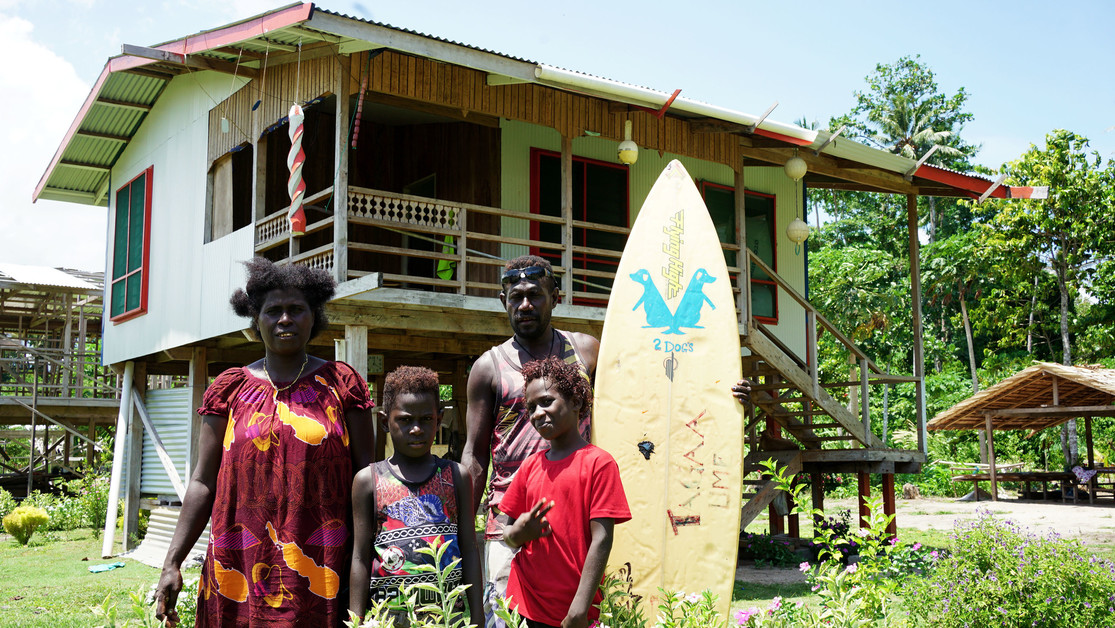Bernice Kumice’s father began teaching her about cocoa farming when she finished high school, but within a few months her life was turned upside-down.
“My parents died in 2000,” she recalled. “We lost one parent in September and the other in December. I had not learnt enough from my father when he passed away.”
With the loss of her parents, Bernice put cocoa aside and trained as a nurse, a profession she continues to pursue. She is a nursing officer at Tearoki Health Centre, where she has worked for nearly two decades.
The 44-year-old lives in Tinputz with her family of B’s – children Bernisa, Beryl and Bevan, and her husband Benjamin, who had had been a subsistence farmer before Bernice supported him to get a carpentry trade at college.
With Bernice working at the health centre, Benjamin self-employed and the whole family heavily involved at the local surf club, their cocoa block languished in the background – rolling along, but not fulfilling its potential.
“I knew nothing about savings and budgets,” Bernice said. “Each fortnight we just spent. Same for cocoa, we sold, got the money and just spent without a proper budget.”
“We did have our struggles about where and how we should get money to pay for school fees and timber to build our house. We just spent our money on unnecessary things and ended up regretting it, and then struggled to look for money again for the important things that we missed out on.”
An opportunity to make changes arose when Bernice heard about cocoa farming training being offered by CARE International and supported by the governments of Australia and New Zealand through the Bougainville Partnership.
It covered hands-on block management techniques and looked at financial planning, budgeting and more equitable family decision making.
“When I heard about the training that CARE was giving, it interested me because the training would help me to manage my own block,” Bernice said.
“Weeding, pruning techniques and spraying are some of the skills I’ve learned. My husband is very impressed, because I can now assist him in managing our cocoa block. It is a lot of work and he cannot work alone, so we share responsibilities and involve our children to work as a family.”
The training did more than improve the family’s cocoa farming – it changed the way they worked together as a unit.
“After the day’s work we discuss ideas as a couple,” Bernice continued.
“We can now organise and manage our resources well. We feel that we can develop our community and raise our standards of living.”
The couple were also identified by CARE as model farmers and encouraged to share their knowledge on agricultural techniques and management skills with others in their community.
“Many people are now coming to seek advice because they see the changes in our lives,” Bernice said.
“We run trainings in the community. People look upon us with respect because of the training that we received from CARE. They trust us and have given us more responsibilities in the community. We are happy to help others,” she continued.
“People are building new houses. They budget their money, they save. They are applying what they learn from the training.”
Like her father before her, Bernice wants to pass on knowledge that will provide the best opportunities for her children.
“I want them to live a happy life with their families. I don’t want them to struggle,” she said.
“I bought a piece of land for them and have planted cocoa. Their cocoa blocks will be their source of income to support them.”
More than 1,300 Bougainvillean women have taken part in the training to date. Bernice said they have greater independence and believes it is a trend that will continue in the next generation.
“I am encouraging mothers to bring their children with them to the training. In that way our children can learn and have a fair idea on how to manage their families in the future,” she said.
“If all our children follow our steps and take up the practice that we are doing now, the next generation coming up will be filled with skilled women.”
For further information, including access to related materials, please contact the Australian High Commission media team: +675 7090 0100
Bernice tends to her cocoa trees

Bernice and her family built a new house with their cocoa income
